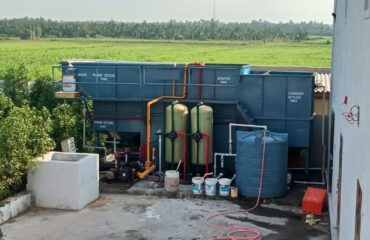Introduction
Mumbai, the financial capital of India, is also a hub for various industrial activities, including plastic recycling. The waste plastic recycling industry plays a crucial role in managing plastic waste, but it also generates significant wastewater. This wastewater, if not treated properly, can cause severe environmental damage. Amrita Water Solution offers advanced Effluent Treatment Plants (ETP) specifically designed for the waste plastic recycling industry in Mumbai. This article explores the importance, key components, and benefits of these ETP systems, ensuring environmentally sustainable operations for the industry.
Importance of Wastewater Treatment in Plastic Recycling
Environmental Protection
The plastic recycling process generates wastewater containing various contaminants, including chemicals and microplastics. Proper treatment is essential to prevent pollution of local water bodies and ecosystems.
Regulatory Compliance
Adhering to environmental regulations regarding wastewater discharge is mandatory for plastic recycling companies. Effective ETP systems ensure compliance, helping to avoid legal issues and fines.
Resource Recovery
Advanced ETP systems enable the recovery of resources, such as water, which can be reused in the recycling process, thereby reducing the overall environmental footprint.
Components of an ETP Plant
Primary Treatment
- Screening: Removal of large solids and debris from the wastewater.
- Sedimentation: Allowing suspended solids to settle at the bottom for removal.
Secondary Treatment
- Chemical Treatment: Addition of chemicals to neutralize harmful substances and precipitate contaminants.
- Biological Treatment: Utilization of microorganisms to break down organic matter in the wastewater.
Tertiary Treatment
- Filtration: Removal of fine particles and residual solids to further purify the water.
- Disinfection: Elimination of harmful pathogens and bacteria to ensure the treated water is safe.
Benefits of ETP for Plastic Recycling Industries
Environmental Safety
Effective treatment of wastewater significantly reduces the risk of environmental pollution, protecting local ecosystems and communities.
Regulatory Compliance
Ensuring that wastewater discharge meets local and national standards helps plastic recycling companies avoid regulatory fines and legal complications.
Cost Efficiency
Investing in wastewater treatment solutions can lead to substantial cost savings by reducing the need for fresh water, minimizing waste disposal expenses, and avoiding regulatory penalties.
Enhanced Corporate Image
A commitment to environmental protection through the use of advanced wastewater treatment systems enhances a company’s reputation and appeal to environmentally conscious consumers and investors.
Challenges and Solutions
High Initial Investment
Solution: Offering flexible financing options and leveraging government incentives can help plastic recycling companies in Mumbai adopt advanced ETP systems.
Technical Expertise
Solution: Providing comprehensive training and ongoing technical support ensures the efficient operation and maintenance of wastewater treatment plants.
Space Limitations
Solution: Designing compact and efficient treatment systems that fit within the limited space available in urban and industrial settings.
Conclusion
The implementation of Effluent Treatment Plants (ETP) is essential for the sustainable growth of the waste plastic recycling industry in Mumbai. Amrita Water Solution delivers state-of-the-art wastewater treatment solutions that enable plastic recycling companies to protect the environment, comply with regulations, and enhance their corporate reputation. Investing in these advanced treatment systems not only benefits the environment but also contributes to the long-term success and sustainability of plastic recycling operations in Mumbai.





